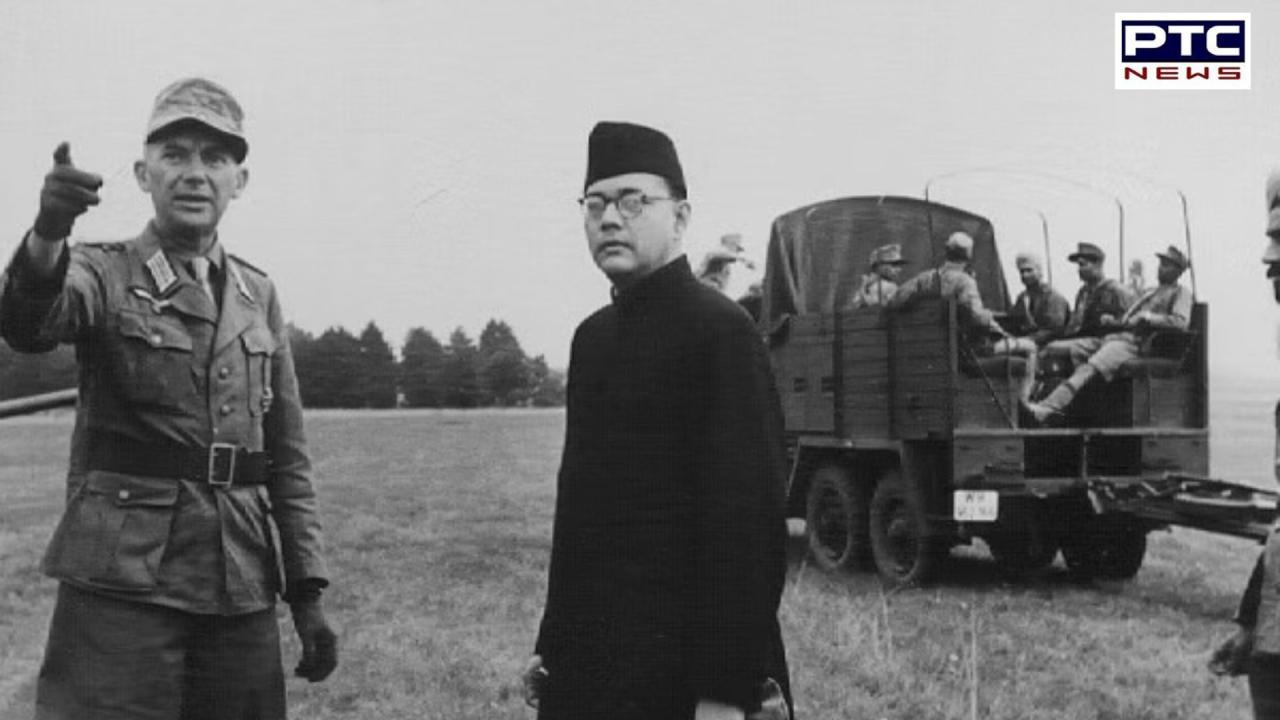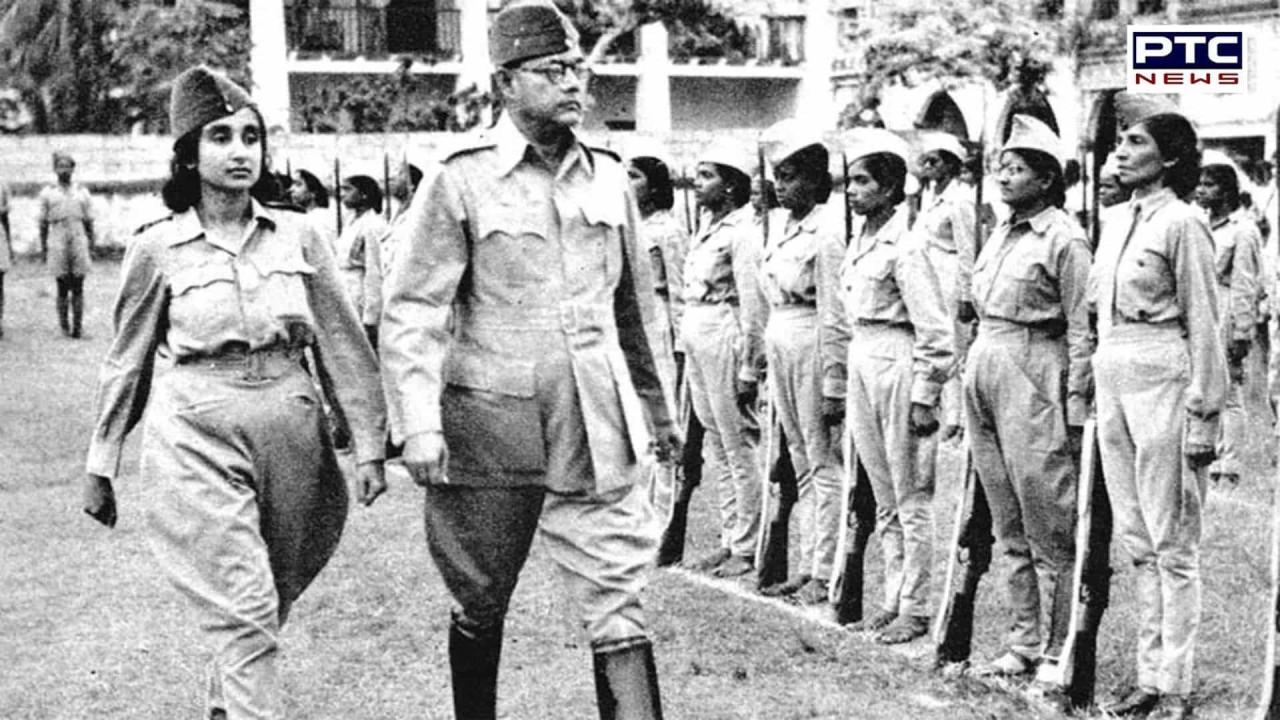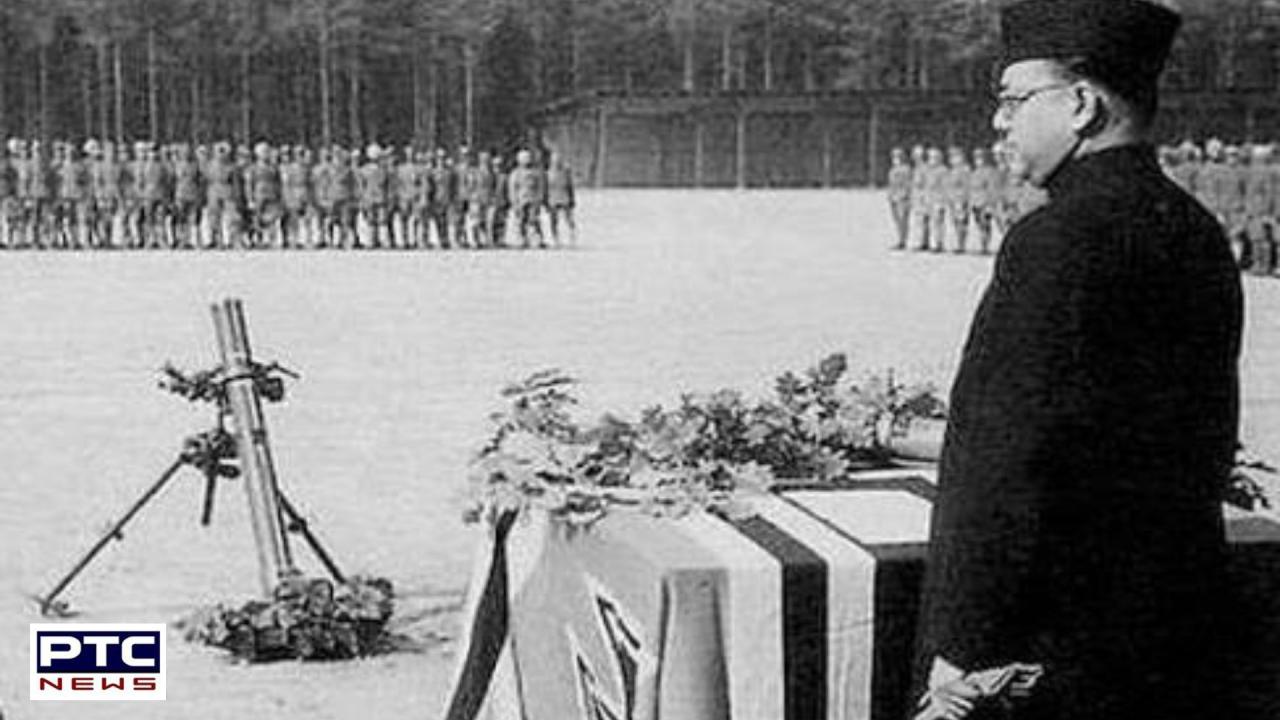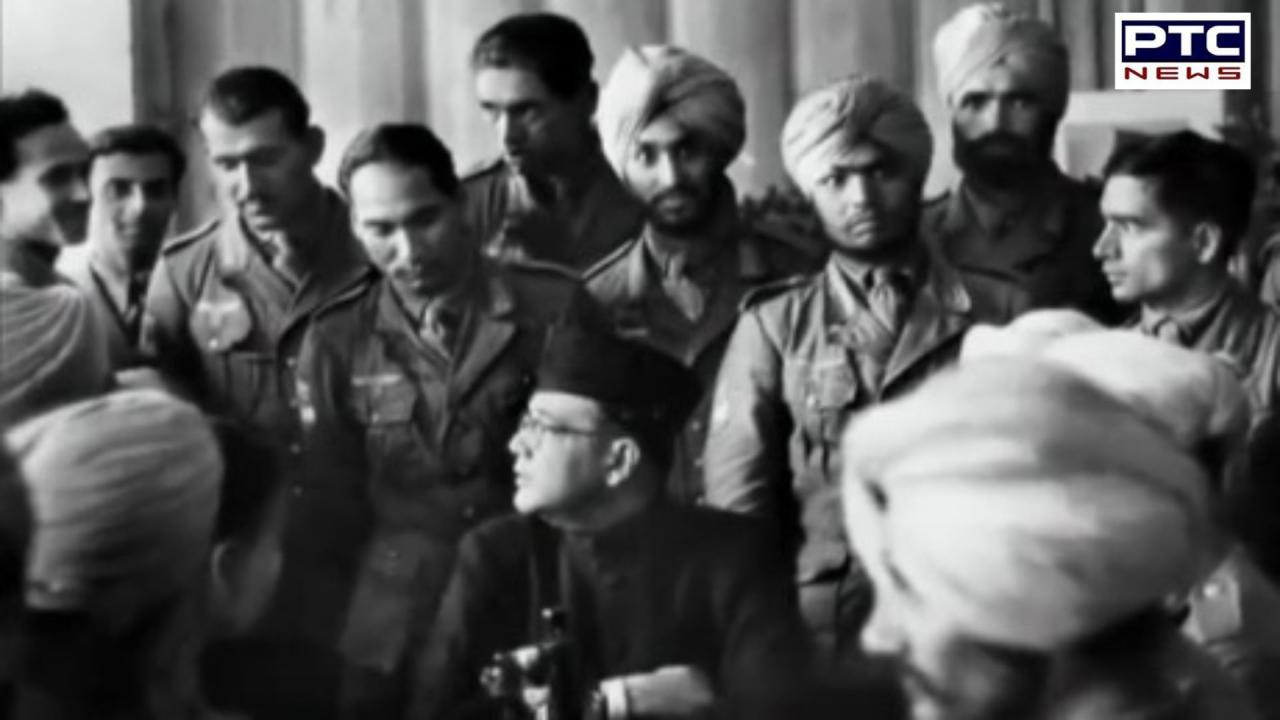

How Bose’s INA contributed to India’s independence—beyond the battlefield
PTC News Desk: As the most significant liberation fighter, Subhas Chandra Bose possessed exceptional leadership qualities and was a captivating speaker. His name was Netaji. In 1943, he organized the inaugural Indian National Army (INA), Azad Hind Fauj, launched an armed takeover, and motivated thousands of young Indians to take up arms in the fight for freedom from British colonial authority.
"Jai Hind," "Delhi Chalo," and "tum mujhe khoon do, main tumhe aazadi dunga" are some of his well-known catchphrases. He is renowned for both his socialist policies and the aggressive strategy he employed to win independence. Many people regard Netaji as one of the finest leaders to have ever lived. Subhas Chandra Bose is still associated with self-assured nationalism.

Born on January 23, 1897, in Cuttack, Odisha, to Janakinath Bose and Prabhavati Devi, Netaji Subhas Chandra Bose became famous with the catchphrase "Give me your blood, and I shall give you freedom". One of Cuttack's most prosperous attorneys, Janakinath Bose was given the title "Rai Bahadur." Later on, he joined the Bengal Legislative Council as a member.
Netaji was an exceptional student who placed second in the matriculation exam. In 1916, he was expelled from Presidency College in Calcutta (Kolkata) due to his nationalist activities. One of Subhas's British instructors, E F Otten, was allegedly assaulted and beat in 1916. A racist remark was made by the professor against the Indian students. Subhas Chandra Bose was thus banished from Calcutta University and expelled from the Presidency College.
Due to the incident, Subhas was added to the list of Indian rebels. He was well-known for his fervent patriotism as a student and was greatly impacted by Swami Vivekananda's teachings. Vivekananda was his spiritual teacher, whom he also loved.

In order to help him prepare for the Indian Civil Service (ICS) examination, his parents sent him to the University of Cambridge in England. He passed the ICS exam in 1920, but he left his lucrative employment after learning of the Jallianwalla Bagh massacre, returning to India in 1921 to support the country's independence movement. He soon left his family to join the Indian National Congress and take an active part in the country's independence campaign.
Upon his return to India, he was influenced by Mahatma Gandhi. He joined the Non-Cooperation Movement, which Mahatama Gandhi had founded and which gave rise to INC, a potent nonviolent group. The Mahatma Gandhi persuaded him to collaborate with Chittaranjan Das, who later became his political mentor, during the movement.
Chittaranjan Das was occupied with formulating the country's policy, but Subhas Chandra Bose was instrumental in educating Calcutta's young, laborers, and students. He could not wait to see India become a federal, republican, and independent country.
Following that, he worked as a youth educator and held the position of Bengal Congress volunteer commandant. He founded the Swaraj newspaper. He was appointed CEO of the Calcutta Municipal Corporation in 1924.

In 1925, Bose was imprisoned in Mandalay for his nationalist activities. After being freed from prison in 1927, he was chosen to serve as both the secretary of the Bengal State Congress and the president of the All India Youth Congress. He was elected Mayor of Calcutta in 1930. The Indian Struggle, written by Bose, recounts the Indian independence movement from 1920 to 1942. The government of Great Britain banned the book.
After winning the Indian National Congress presidency in 1938, he established a national planning council that developed a wide industrialisation strategy. This, however, was at odds with Gandhian economic theory, which held fast to the idea of cottage enterprises and the advantages of using domestic resources. Furthermore, it appears that Bose and Gandhities differed fundamentally in their approaches to policy and strategy when evaluating India's readiness for the Civil Disobedience campaign and the favorable international environment.
Bose's victory over a Gandhian opponent for reelection in 1939 served as his vindication. However, the "rebel president" felt compelled to step down due to Gandhi's lack of endorsement. He opposed India's enlistment as a British ally in the Second World War as well. "By freedom, I mean complete freedom, that is, freedom for the individual and society; freedom for the wealthy and the poor; freedom for men and women; freedom for all individuals and all classes," he declared.
Bose was a socialist and leftist authoritarian in his philosophy. In 1939, he established the All India Forward Bloc as a Congress division. Bringing all of the Congress party's extreme components together was the Froward Bloc's main goal. so that he might propagate the idea of India's full independence while adhering to the application of social justice and equality principles.
Despite their stark political differences, Bose harbored a great deal of affection for Gandhi. Subhas Chandra Bose was in Berlin in August 1942 when Mahatma Gandhi started the Quit India agitation. According to records, Subhas Chandra Bose informed his close ally CN Nambiar that he had to "be with Gandhi" after getting this news in Berlin. Mahatma Gandhi's Quit India Movement was referred to as "non-violent guerilla warfare" by Subhas Chandra Bose in a Berlin-based Azad Hind Radio broadcast.
Gandhi was equally impressed by Subhas's bravery and resourcefulness in escaping from India. The extent of Subhas Chandra Bose's admiration for them is demonstrated by another occurrence that followed the death of Mahatma Gandhi's wife, Kasturba, in 1944. From Myanmar, then known as Burma, he declared Kasturba Gandhi to be "a mother to the Indian people" in a statement.
Subhas Chandra Bose referred to Mahatma Gandhi as the father of the country during his radio broadcast, during which he launched attacks on the British army. "Father of our Nation!" declared Subhas Chandra Bose in his final radio broadcast from Burma in 1944. We beseech your favor and well wishes in this holy fight for the independence of India.
The establishment and operations of the Azad Hind Fauj, popularly known as the Indian National Army, or INA, during World War II, marked a significant turning point in the fight for independence. With the help of Indians residing in southeast Asia, Rash Behari Bose, an Indian revolutionary who had fled India and lived for many years in Japan, founded the Indian Independence League.
With the intention of freeing India from British control, the league assembled the Indian National Army from among the Indian prisoners of war after Japan routed the British army and captured nearly all of the countries in south-east Asia. This army was organised in large part by General Mohan Singh, an officer in the British Indian army.
Because Subhas Chandra had been defying British control, the British had placed him under house arrest in the interim. But in 1941, he fled the nation covertly. It took several days for the authorities to discover that he was not in his barrack, the residence where he was under security.
He went by train, automobile, and foot until resurfacing in Afghanistan's capital of Kabul before going missing once more. His German radio program in November 1941 thrilled the Indian masses and sent shockwaves through the British establishment, alerting them to their leader's great plan to free their country. It also instilled newfound confidence in the Indian rebels who were confronting the British on multiple fronts.
When he went to Japan in 1943, the royal government approved of his request for assistance. Here, he reconstructs the Indian National Army (Azad Hind Fauj) to make it a potent tool for India's independence. About 45,000 soldiers participated in the Azad Hind Fauj, including Indians who were incarcerated in several south-east Asian countries and prisoners of war. In October 1943, he established an interim administration that was acknowledged by the Axis Powers as part of the Second World War. After INA liberated the Andaman and Nicobar islands from British rule in December 1943, they were renamed Shaheed and Swaraj islands.
India's liberation from the Eastern Front was Subhas Chandra Bose's goal. The Gandhi, Azad, and Subhas Brigades were established. On the Indian Border, INA overran Coxtown after marching through Burma. Now that they were in India, they were determined to expel the British! The battle cry was Delhi Chalo, or "Let's march to Delhi." The warriors who had invaded India, according to one of the most important commanders of the Azad Hind Fauj, Shah Nawaz Khan, lay themselves down on the ground and kissed the hallowed soil of their motherland with great fervor.
Nonetheless, the Azad Hind Fauj's endeavor to free India was unsuccessful. But Bose was never one to give up. He tried to run away and start fighting all over again. He never made it out of Taihoku Airport, where he fled on a plane. It is reported that his aircraft went down near Formosa, which is now Taiwan. It is reported that he had third-degree burns, entered a coma, and never awoke. Netaji Subhas Chandra Bose's body was never found, despite the widespread belief that he perished in an aircraft crash. Several explanations have been proposed in relation to his disappearance.
The Indian government established several committees to look into the matter and determine the truth. According to the findings of the Shah Nawaz Committee (1956) and the Figgess Report (1946), Bose perished in the Taiwan plane disaster. The earlier reports were also supported by the Khosla Commission (1970). In Parliament on May 17, 2006, the Justice Mukherjee Commission's reports were presented, stating that "Bose did not die in the plane crash and the ashes at Renkoji temple are not his." The Indian government, however, disapproved with the conclusions.
One of the greatest liberation fighters in India was Subhas Chandra Bose. Subhas Chandra Bose will always be remembered as a pivotal figure in the history of India's fight for independence from the British. Being a doer from the beginning, Bose chose to forge his own route to India's freedom while being aware of how difficult it would be.
In 1943, he brought back to life the Indian National Army, also referred to as "Azad Hind Fauj," which Rash Behari Bose had founded in 1942. Even though it was brief, the INA's attack had a significant role in the British decision to halt operations and return to their own territory in the end. Ultimately, this did open the door.
"We have a grim fight ahead of us because the enemy is powerful, unscrupulous, and ruthless," Subhas Chandra Bose told the Army. You will have to endure death, starvation, forced marches, and privation on this last march to freedom. You won't be free until you pass this test. The Indian National Army (INA) engaged in numerous battles to establish independence for the Indian dominion. Only Subhas Chandra Bose's extraordinary intelligence made all of this possible.
He advocated for practical economic planning and led by example. It is also vital to keep in mind that he was the one who pushed Indian women to take a leading part in the campaigns for India's independence. Azad Hind Fauj established a women's unit, which Captain Lakshmi Swaminathan commanded. The regiment was known as the Rani Jhansi. Azad Hind Fauj developed into
the people of India's emblem of bravery and solidarity. Bose's ferocious comments inspired the soldiers. "Give me blood, and I shall give you freedom" is his well-known saying.
Additionally, Subhas was an excellent explorer. His valor, unparalleled patriotism, and military feats have elevated him to the status of an inspiration for India's youth. He continues to serve as a beacon of hope and inspiration, existing only in our hearts and thoughts.
Like other great men of the day like Jawaharlal Nehru and Mahatma Gandhi, he contributed significantly to the nation's liberation from the shackles of two centuries of British control. Between 1920 and 1941, he was sent to prison eleven times. Even at the time of his death, he was planning to move to Russia and find a new way to fight the British. He continued to fight the British until the very end of his life as an active freedom fighter, and it is this tenacity and patriotic fervor that should be respected above all else.
Every year on January 23, many sections of the country celebrate Subhas Chandra Bose's birthday in remembrance of his contribution to India's independence movement.
- With inputs from agencies
